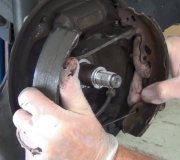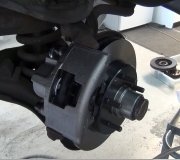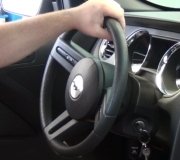Replaced rotors, pads, calipers. Daughter drove it to school 40 miles and OK. 8 hours later when returning home, she noticed brake pedal felt hard when pressed. Also had to push hard to get brakes to work. After a couple miles of stop and go city driving, couldn't get past 40 MPH once she got on the 4 lane. She could smell hot brakes.
I told her to pull over and stop. 20 minutes later she started the car again and after putting the car in gear and taking her foot off the brake, the car would coast and pull itself without brakes dragging. She drove remaining 38 miles home without incident. This same problem happened 2 days later.
When she got home, both front rotors are hot enough to burn and have a slight smell. The last 20 miles home are rural driving with very little braking required.
I jacked up each front wheel and both can be turned by hand without much effort.
Fluid in master appears clear and not milky.
This car does not have ABS.
Friday, March 26th, 2010 AT 8:37 PM


